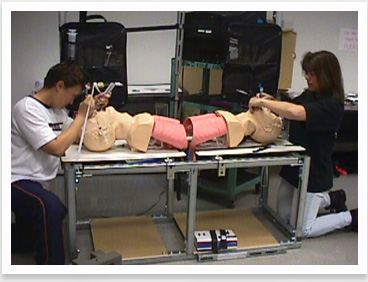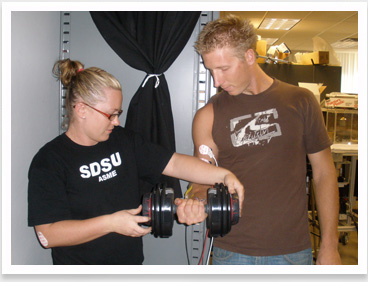

Students working on a project to evaluate intubation under microgravity conditions called Airway Management in Space
What is Bioengineering?
Bioengineering is a discipline that advances knowledge in engineering, biology and medicine, and improves human health through cross-disciplinary activities that integrate the engineering with the biomedical sciences and clinical practice. It includes:
1. The acquisition of new knowledge and understanding of living systems through the innovative and substantive application of experimental and analytical techniques based on the engineering sciences.
2. The development of new devices, algorithms, processes and systems that advance biology and medicine and improve medical practice and health care delivery.

History of Bioengineering
Over the last few years there has been a major paradigm shift in the United States and other developed nations towards health care systems which are much more dependent on technology. This is true in terms of diagnosis (eg body scanners); treatment (radiation therapy and minimal access surgery); and health care system integration (via information technology).
As medical practice becomes more technologically based, a progressive shift is occurring in industry to meet the demand. Developments in science and engineering are increasingly being directed away from traditional technologies towards those required for health care in its widest sense. Although in many countries there is a problem with escalating costs in the medical sector, technology can contribute to economies because of falling costs of electronic/physics based components and because of technologically based screening.

Students prepare the cardiac simulator for testing medical devices
Where do they work?
Biomedical engineers are employed in industry, in hospitals, in research facilities of educational and medical institutions, in teaching, and in government regulatory agencies. They often serve a coordinating or interfacing function, using their background in both the engineering and medical fields. In industry, they may create designs where an in-depth understanding of living systems and of technology is essential. They may be involved in performance testing of new or proposed products. Government positions often involve product testing and safety, as well as establishing safety standards for devices. In the hospital, the biomedical engineer may provide advice on the selection and use of medical equipment, as well as supervising its performance testing and maintenance. They may also build customized devices for special health care or research needs. In research institutions, biomedical engineers supervise laboratories and equipment, and participate in or direct research activities in collaboration with other researchers with such backgrounds as medicine, physiology, and nursing.
Some biomedical engineers are technical advisors for marketing departments of companies and some are in management positions. Some biomedical engineers also have advanced training in other fields. For example, many biomedical engineers also have an M.D. degree, thereby combining an understanding of advanced technology with direct patient care or clinical research.
SDSU Bioengineering Program 5500 Campanile Drive San Diego, CA 92182-1323
Engineering 326 Tel: (619) 594-6067 Fax: (619) 594-3599